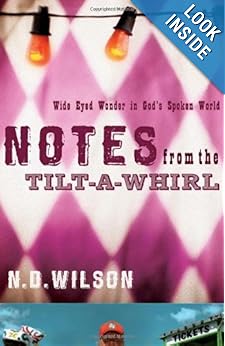
Notes from the Tilt-A-Whirl: Wide-Eyed Wonder in God’s Spoken
World by N.D. Wilson
Get ready for a dizzying adventure while you take a sip of
you Jolt soft drink while reading this book by N.D. Wilson, namely Notes from
the Tilt-A-Whirl. Capturing the beauty
of God’s creation, the ferocity of red hawks, and the way in which philosophy
maddens even the best of students, this book is a one of a kind. Wilson, Fellow of Literature at New Saint
Andrews College (associated with Douglas Wilson), puts words on the page that
make you cry, rejoice, and laugh all within one page. The chapters engage larger topics such as
creation, evil, hell, philosophy, and purpose while engaging them in a fluid
way through the movements of life.
Finally, you come away with a sense of the grandeur of the world we live
in with a central purpose being that living to the fullest is recognizing our
all that we encounter (from skunks to red hawks to a sunset) is inundated with
the stamp of our Creator.
In his chapter on The Problem of Kittens Wilson aptly
writes, “This God invented armpits. Does
He grieve when they make you stink?
This God invented leeches and mosquitoes and bedbugs that bite. Did He not? …Why do these things not fit on
our postcards? Why do we omit them in
the abridged extra-holy version of reality for families?” (153). We have made God small if we corner off the
very pesky things that we don’t like to talk about much but have to deal with
on a regular basis. Even the leeches and
the skunks reverberate something of the genius of a creative hand, much more of
a comical side as well. The point Wilson
is trying to make in the chapter is that cute kittens and fluffy angels don’t
cut it when we’re talking about God’s creation.
We want to cut the corners off of our PB&J’s, but fail to notice
those same corners hold our sandwich together.
Gentle and cuddly creatures speak to us of comfort while the more wily
things of the world point out our fears and inhibitions. We don’t put these things on postcards
because we’re careful to saw down our bunions so no one will see.
Wilson takes on the absurdity of full blown evolution and
the Big Bang Theory on his chapter on Your Mother Was a Lizard. He writes, “Serve Boom, and you and I can
still get along, but the way we see things changes everything. I see intentionality in the world, and so I
imitate that in my art (and in the art I respect). You see a world that is not more than a large
explosion, and the art that imitates that is a form of suicide” (129). The folly of Jackson Pollock is the creation
of art in imitation while still viewing the world as an accident. From the creation of llamas to the dragonflies
buzzing around your head, intentionality and beauty is everywhere. The notion of natural selection cannot
produce a moral authority to care for the planet for it provides no meaning
apart an initial explosion. Wilson
weaves his writing through the absurdities of a universe coming together by an
explosion with wisdom, wit, and downright laugh out loud moments.
Really, this is one of the best books I’ve read in
years. Brimming with wisdom and passages
of sheer delight, Wilson takes his cue from a robust natural theology.
Thanks to BookSneeze and Thomas Nelson Publishers for the
complimentary copy of this book in exchange for review.
Comments
Post a Comment